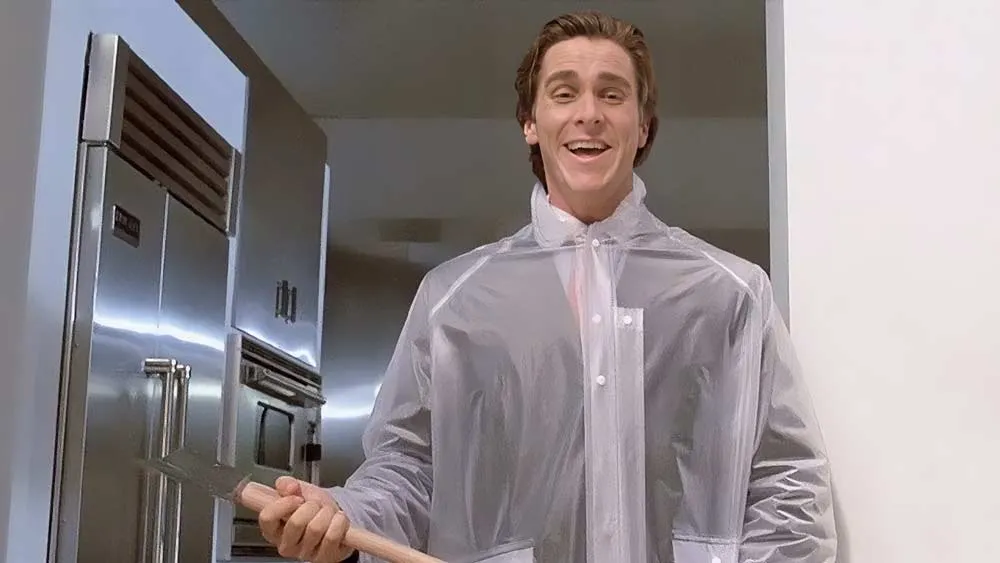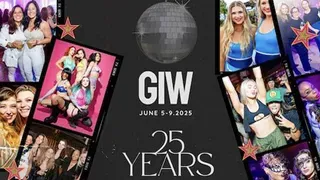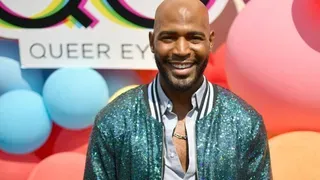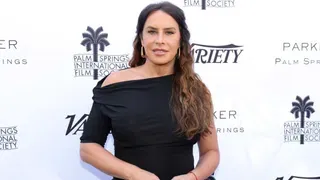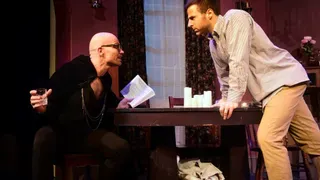
November 13, 2024
EDGE Interview: Mason McCulley Explains 'Carole Cook Died For My Sins'
Steve Duffy READ TIME: 12 MIN.
Red-headed actress Carole Cook is best-known due to her relationship to another famous redhead – Lucille Ball. Ball had convinced the New York-based actress to come to Los Angeles after reading a positive review of her performance in "Annie Get Your Gun," and the two became friends and colleagues, with Cook appearing in multiple episodes of "The Lucy Show" and "Here's Lucy" in the 1960s and 1970s. Cook would go on to appear in films (most memorably in "Sixteen Candles" as Molly Ringwald's character's grandmother.
Cook was also a best friend to out actor Mason McCulley during the last years of her life. How the 30-something actor, best known for his ongoing role on HBO's "Insecure," became friends with an actress some 60-years his senior is explored in his play – or as he puts it, his sermon – entitled "Carole Cook Died For My Sins," his solo piece that received strong reviews in its recent Los Angeles premiere that has been extended through November 24 at the Skylight Theatre (For more information, click here).
McCulley got close to Cook during his late mom's final years. Then when Cook died, he had a two-week spiral. "I got to rock bottom once Carole died," he told Socialite Life in a recent interview. "I went on about a two-week sort of West Hollywood bender at all the gay bars, doing all the things – which I was no stranger to. I had done that more than several times in my life, but it was spiraling towards rock bottom."
McCulley quit drinking, and from his grief, he saw clarity. Feeling guidance from Cook, he moved to New York and developed his one-man show, which follows his journey from conservative Alabama to success as an actor. It also chronicles his coming out and his close relationships with his mother and with Cook. "Aptly comparing his one-man show with the nakedness of pornography, Mason leaves no stone unturned, chronicling sobriety, his sex life, and the seismic impact the deaths of Carole Cook and his mother had on him. These experiences outline a period of significant moral flux, one in which McCulley learned a myriad of lessons about life and how we should live it," writes Henry Vaughn in his review for The Larchmont Buzz.
McCulley and Cook appeared in an episode called "The Visit" on Season 1 of the Emmy-winning, short-form web series "Break a Hip" in which the show's elderly and cranky protagonist (Christina Pickles) confronts Cook for a late-in-life reality check. McCulley played her most devoted servant, protective of his boss while massaging her feet. (To watch the episode, follow this link).
EDGE spoke to McCulley about his relationship with Cook, writing the show, and why Cook should be an icon in the LGBTQ+ community.
Editor's note: Introduction by Robert Nesti.
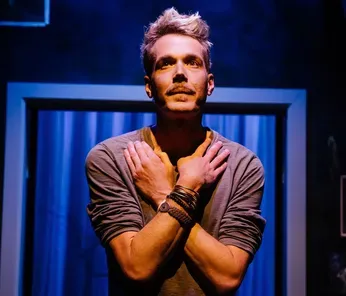
Source: Instagram
EDGE: Tell us a little bit about yourself.
Mason McCulley: My name is Mason McCulley. I am an actor and now, I guess, a writer because of this play. I'm originally from Birmingham, Alabama. I am 42 years old. I came to Los Angeles in 2002 to study theater at Pepperdine University. I did that so that I could be closer to LA. I have always dreamed of being on TV and in films, and I knew that if I got out to LA for university, that would happen.
EDGE: Tell us about your show "Carole Cook Died For My Sins."
Mason McCulley: Where do I begin? "Carole Cook Died For My Sins" is a solo show I wrote, and it is my truth. It is a true story about what happened when my dearest friend, the iconic actress Carole Cook, passed away in January 2023, three days shy of her 99th birthday. She was incredible. We were soulmates on so many levels. Even with a 60-year age difference, she was one of my dearest friends. When my mom was diagnosed with frontal temporal dementia in 2015, Carole and I became really close. That's when my life got a little darker and a little more chaotic. At that time, we were already close, but that's when we really got close because she looked over me and looked after me. When my mom got sick, I believed in nothing, but I believed in Carole because I could see her, and she was a part of my life. So, when Carol died, I spiraled, and I went on a two-week bender in West Hollywood that I detail in the play. After those two weeks of partying, I woke up literally, figuratively, and metaphorically, and I decided that I had to make a change in my life. I had to seek light and hope, so I felt I had something to give and started a journey towards myself. I am obsessed with the title because it is wildly irreverent while simultaneously being reverent because Carole was so irreverent. "Fuck 'em if they can't take a joke," was her motto. So, I have replaced Jesus Christ with Carole Cook, which is delicious.
EDGE: Was writing this show therapeutic for you?
Mason McCulley: Beyond. My director, Cameron Watson, is brilliant. He's been my mentor for at least 15 years. He knew Carole, and he guided me through the process. When we first started this journey, which was not that long ago, it was wild that it was all happening so quickly, but when something's inside of you, you just have to fucking get it out. He advised me to write it all down when we started this journey. So, I wrote it all down, and now, it'll be a book one day. I've got a lot, but now we have to take all those delicious things, tell the same story, and convey every emotion more concisely. He told me to tell it all even if we only see it. Tell the darkness and go to the dark places. And to your point, it's been beyond therapeutic and allowed me to visit the past without staying there. One of the main themes of this place is shame, and I can go back to those places and see how I acted and why I acted and reflect on the things that I did and give them to the audience in a way where they can come with me. Perhaps a little gay boy is sitting in the audience; the show is for 18 plus, who will then be able to say, "I don't have to go to those places because Mason already did.

Source: Rowan Daly
EDGE: Was it challenging to revisit some of the shameful things?
Mason McCulley: There are certain pieces in the play that, when I first started writing it, I didn't think I would say out loud on stage, and the more I got into the process, I knew I was going to do it. That's the impetus of my journey. Now, I say it out loud because that is not who I am anymore. It has been very freeing. There have been times that I did not think I would say them out loud, but when you do say them out loud, it's almost like they don't exist anymore. The weight is gone, and they don't have power over me. Also, I'm not necessarily concerned about sharing these stories and this journey with my friends and strangers, but my family is coming to see it. My two sisters and my conservative dad from Alabama, who's incredible and who has been my biggest cheerleader my entire life, will be there. He has always supported me through all the crazy creative ventures I've been on since I was a little kid. I told him, "Dad after you see this play, all your questions will be answered about what I was up to during those 20 years in Los Angeles. You will have more questions, I promise. They are going to celebrate it all. They know what they're getting into, but it's never been said aloud.
EDGE: Talk to us about the virtual role women play in the lives of gay men.
Mason McCulley: I talk about the feminine side, especially regarding the women in our lives; it is an essential theme of my piece. It's my mother, Carol, and then my friend Jessica Rodder Murphy. She is a brilliant musician. She's composing the music that scores the piece. I wanted it to be a female voice because of its connection to the feminine. As gay men, we're breaking away from patriarchy. That's what we do. We are breaking away from this straight idea. I think the reason I am so drawn to the women in my life is because, as gay men, we exist in the masculine, and we know the power of the feminine. We understand that the power of the feminine is not the weaker of the two. It's stronger. Historically, the women in our lives have supported us and carried us through. I am stronger because of the support that I received. I'm wearing one of Carole's iconic caftans in some of the photo shoots I did for the show. I believe she wore it on one of Lucy's shows and on stage in Private Lives in Dallas in the seventies. I wear it as an homage to the show and Carole, celebrating that gorgeous feminine power that she held.
EDGE: What have you learned about yourself while writing the play?
Mason McCulley: Oh gosh, what a loaded question. This is what I've learned. There is freedom in truth. There is freedom in yourself when it comes to truth, and if you are willing to tell the truth, stage aside, I am getting on stage and telling the truth. If you're willing to tell yourself the truth, what really happened, and own it, I'm learning daily. I'm trying to own the mistakes that I've made and the things that do still have shame around them, but if you're willing to go back and look at them and own them and say, "I did do that, and I did act that way" and own it and then ask, "Why did I act that way? Why did I do that?" I drown myself in alcohol because my mom was sick. I didn't realize it when I was in it because my mom was ill, and she went away. Thank God I had Carol. The truth is the answer to everything, even when it's difficult. It can be extremely difficult. That's the biggest lesson I've learned - if you're willing to tell and seek the truth, you'll find the answer. And sometimes, the answer is much simpler than you thought. Also, the truth makes for a really good story.
EDGE: Having Carole Cook in your life has meant what?
Mason McCulley: I'm staring at a photograph of her right now, and she's staring back at me. I can't show you it because it's in the play and it's a secret. She was my North Star while she was alive, and now I will keep her memory alive. If Covid had not happened, Carole would've performed until the day she died. Her last public performance was in 2019 at the Purple Room in Palm Springs. I remember watching her and thinking, goodness gracious, how is it that this woman, with all her ailments, is still working? What she has taught me is to keep going and never stop. She had a lot of disappointments in her life regarding her career, but she kept going. Carole and I had a 60-year age difference, and in the end, I was one of the most important people in her life, and she was one of the most important people in mine. You never know who you're going to meet, and you never know what will happen. If you keep going, opportunity and magic will reveal themselves, and she believed that. She believed if you kept going, there would be more to discover. So, to answer your question, she meant everything to me.
EDGE: Tell us about Carole's fierce advocacy for the LGBTQ+ community.
Mason McCulley: I think being a woman of the theater, especially in musical theater, made her an advocate for gay men. The AIDS epidemic hit while she was performing in the original cast of 42nd Street. That is not the correct term, but when AIDS came into our vision and started taking over our culture, she would tell me the stories of chorus boys. She would always say, "One of our boys contracted it." At that point, I didn't even think that they were calling it AIDS yet. Carole was fearless when going to the hospital and visiting her friends. She would hold their hand and be with them. Always trying to make them smile, she would say things like, "You look so thin, you need a cheeseburger." Certain people would only want Carole to visit them because of her kindness and loving nature. She was a fierce advocate regarding HIV and AIDS fundraising and research. For over 30 years, they called her the matriarch of the S.T.A.G.E. benefit; it was the world's longest-continuously-running AIDS benefit until it ended. They raised millions of dollars for people living with HIV and AIDS and AIDS research. She was also involved in the REAF benefit in San Francisco with her husband, Tom Troupe. These two projects were what she was proudest about. She was at the forefront of it, not only when it happened but also saying, "Let's get rid of the stigma." She would talk about losing an entire generation of her friends, and it was not just her friends but also those brilliant artists in the eighties and nineties. She told me how she would run into friends on the street in New York and could tell that they were sick, and then a week later, they'd be gone. She was a fierce fighter for the LGBTQ+ community until the very end.
EDGE: What do you hope audiences take away from this play?
Mason McCulley: Well, one thing that I do say is the show really isn't about Carole Cook. The show is about my journey. Carole Cook is one of the leading forces in my journey. I call this my sermon and my gospel because I want to shout from the rooftops that If you are in a place, you don't have to stay there. Gosh, it was dark for me. It was incredibly dark for me. I can't believe it when I wake up in the mornings; I'm getting ready to do a show about my dearest friend Carole Cook and my mother. I can't believe that I got to experience the things I did. Removing yourself from that place will take everything within you, but do it. It is worth it.
EDGE: What's next for "Carole Cook Died For My Sins" and yourself?
Mason McCulley: It opens October 20 at the Skylight Theater in LA and will run for three weeks, perhaps longer. I want to take it on the road, ideally to New York, where Carole started in the fifties. Even if it's a little run, I want to take it there, but it would also be really fun. I would also love to take it to P-Town, Fire Island, San Francisco, Palm Springs, Key West, or any other gay little theater I can find. I want to talk to people who remember her, whether it's from movies or Broadway. I want to go and Kiki with them. That would be so cool. So that's the dream, and I think it will happen.
"Carole Cook Died For My Sins" continues through November 24 at the Skylight Theatre. (For more information, click here).
For more on Mason McCulley, visit his website.
